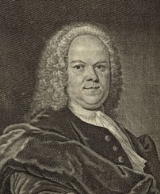
Christian August Hausen
Encyclopedia
Christian August Hausen was a German
mathematician
who is known for his research on electricity
.
Hausen studied mathematics at the University of Wittenberg and received his master's degree in 1712. He became an extraordinary professor of mathematics at the University of Leipzig
at the age of 21 and later (1726) became an ordinary professor.
Hausen also researched electrical phenomena
, using a triboelectric generator. In the introduction to his book on this subject, Novi profectus in historia electricitatis, published posthumously, Hausen states that he started these experiments shortly before his death. Hausen's generator was similar to earlier generators, such as that of Francis Hauksbee
. It consisted of a glass globe rotated by a cord and a large wheel. An assistant rubbed the globe with his hand to produce static electricity
. Hausen's book describes his generator and sets forth a theory of electricity in which electrification is a consequence of the production of vortices in a universal electrical fluid.
Germany
Germany , officially the Federal Republic of Germany , is a federal parliamentary republic in Europe. The country consists of 16 states while the capital and largest city is Berlin. Germany covers an area of 357,021 km2 and has a largely temperate seasonal climate...
mathematician
Mathematician
A mathematician is a person whose primary area of study is the field of mathematics. Mathematicians are concerned with quantity, structure, space, and change....
who is known for his research on electricity
Electricity
Electricity is a general term encompassing a variety of phenomena resulting from the presence and flow of electric charge. These include many easily recognizable phenomena, such as lightning, static electricity, and the flow of electrical current in an electrical wire...
.
Hausen studied mathematics at the University of Wittenberg and received his master's degree in 1712. He became an extraordinary professor of mathematics at the University of Leipzig
University of Leipzig
The University of Leipzig , located in Leipzig in the Free State of Saxony, Germany, is one of the oldest universities in the world and the second-oldest university in Germany...
at the age of 21 and later (1726) became an ordinary professor.
Hausen also researched electrical phenomena
Electricity
Electricity is a general term encompassing a variety of phenomena resulting from the presence and flow of electric charge. These include many easily recognizable phenomena, such as lightning, static electricity, and the flow of electrical current in an electrical wire...
, using a triboelectric generator. In the introduction to his book on this subject, Novi profectus in historia electricitatis, published posthumously, Hausen states that he started these experiments shortly before his death. Hausen's generator was similar to earlier generators, such as that of Francis Hauksbee
Francis Hauksbee
Francis Hauksbee the elder , also known as Francis Hawksbee, was an 18th-century English scientist, and a Fellow of the Royal Society...
. It consisted of a glass globe rotated by a cord and a large wheel. An assistant rubbed the globe with his hand to produce static electricity
Static electricity
Static electricity refers to the build-up of electric charge on the surface of objects. The static charges remain on an object until they either bleed off to ground or are quickly neutralized by a discharge. Static electricity can be contrasted with current electricity, which can be delivered...
. Hausen's book describes his generator and sets forth a theory of electricity in which electrification is a consequence of the production of vortices in a universal electrical fluid.

